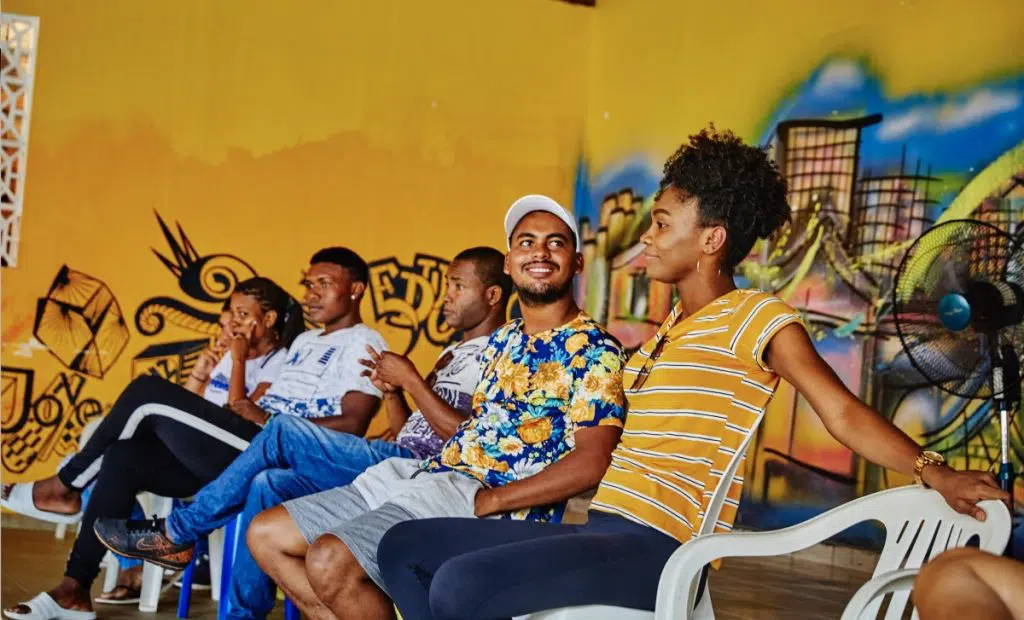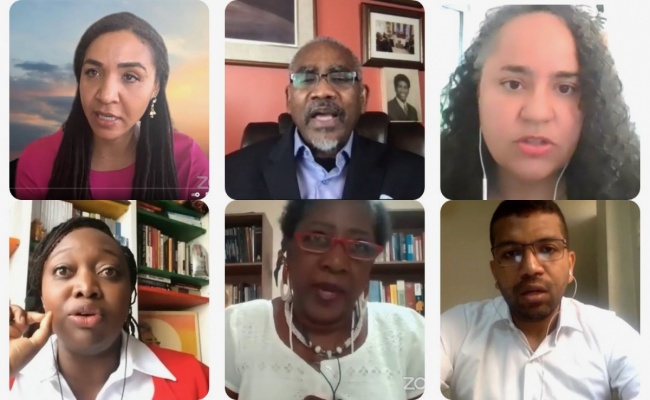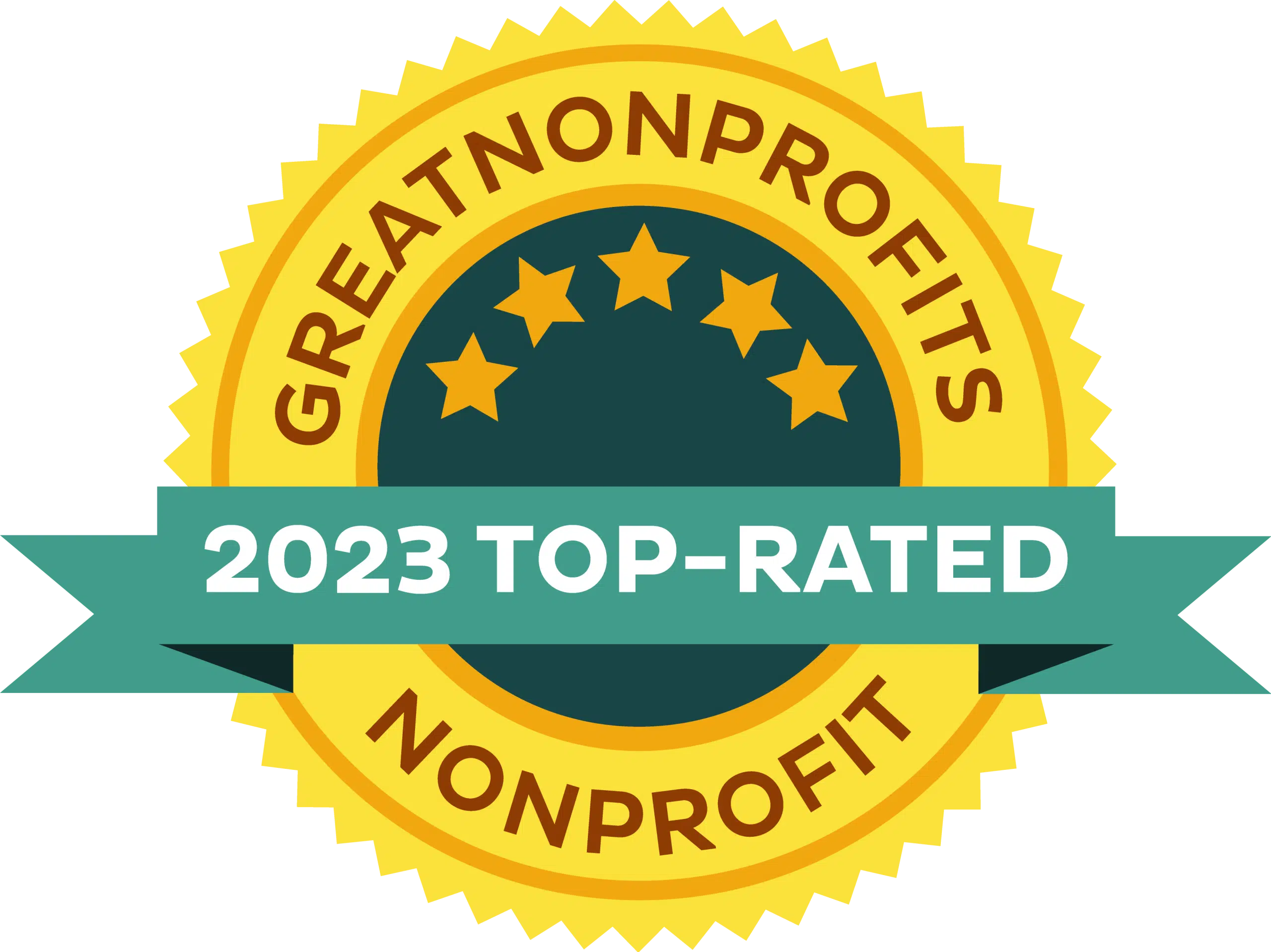On March 26, 2021, the Inter-American Dialogue and the Inter-American Foundation (IF) held an event to discuss the numerous ways COVID-19 has disproportionately hurt Afro-descendant communities in Latin America.
The Afro-descendants: Striving for Equality in Latin America event assembled experts to examine the unique challenges faced by Afro-descendants and deliberate on current social, economic, and cultural policies. IF President Paloma Adams-Allen, U.S. Rep. Gregory Meeks, and President of the Inter-American Dialogue Michael Shifter gave opening remarks and the live stream was broadcast in Spanish, English, and Portuguese.
During the talk, Meeks noted that while one in four people in Latin America are Afro-descendants, they experience disproportionate impact from the health and economic crises inflicted due to the pandemic, in addition to high levels of discrimination and poverty.
“Coronavirus rates for Afro-descendants may be three to eight times higher than the population as a whole,” said Senior Advisor for Social Development in the Gender and Diversity Division at the Inter-American Development Bank, Judith Morrison.
According to Morrison, this could be due to multifaceted implications, such as higher rates of people of African descent employed as front-line workers or working in the informal sector, as well as disproportionate access to healthcare.
However, there is a lack of data on how the virus affects Afro-descendant communities, which prevents researchers from understanding the breadth of this problem. As Morrison discussed, a main challenge for these communities with COVID-19 is they fear unequal treatment if they disclose their race and ethnicity while receiving healthcare services, so they refrain from adding this information. This lack of data has hindered healthcare workers and researchers from getting an accurate depiction of what these communities are facing, which could lead to inequitable and unequal distribution of resources.
These resources are not just healthcare-related. With the world heavily relying on technology to adapt to life during the pandemic, local Afro-descendant communities have faced challenges to accessing online education, leaving children a year behind in school, according to Maria Sylvia De Oliveria, president of GLEDÉS Instituto da Mulher Negra of Brasil.
De Oliveria said that African-descendant children are experiencing a digital apartheid from the unequal opportunities given due to the pandemic.
“When you talk about the impact of the pandemic on education, the World Bank reports that 7% of Brazilian children run the risk of not learning how to properly read a basic text by the age of 10. The negative effects on human capital are simply tragic,” Maria Sylvia De Oliveria said.
Before the pandemic, Afro-descendant communities had increasingly closed the gap of accessing education in primary schools. Morrison discussed that many countries in Latin America, especially Peru, Brazil, and Uruguay, had been able to create greater access to education for these communities. Greater access to primary education and completing early stages of education leads to higher education rates and more future opportunities, both professionally and in higher education.
In addition, Panama, Costa Rica, and Nicaragua have shown high rates of educational attainment, particularly amongst African-descendant women, according to Morrison. These countries have been able to maximize the limited resources available to generate increased education opportunities.
The pandemic has challenged these gains due to necessary social distancing measures and school closures. Even so, Meeks said the pandemic has spurred an international opportunity for transnational efforts to eliminate racial inequities and to offer interdisciplinary resources.
According to Meeks, programs that provide access to economic, educational, and leadership opportunities for people of African descent are helping to act toward building stronger economies and more just societies. Opening opportunities in these areas is possible through strengthening partnerships nationally and internationally to continue inclusive development and representation throughout the Western hemisphere. Strengthening representation in democracy, human rights, as well as opening greater access to education, employment, entrepreneurship, and trade for people of African descent, guides the Americas’ work towards becoming a more equal and just society.
“We must start with a commitment to these values at home so we may lead by the power of our example abroad,” Meeks said.
Building a deeper understanding of racial topics and racial themes has also brought about change in public policy. De Oliveria discussed how conversations at the 2009 United Nations World Conference Against Racism (WCAR), otherwise known as the Durban Conference, have played a pivotal role in enacting more inclusive policies. The Conference allowed people of African descent to advocate their voices to make important progress for these communities.
“Here in Brazil, our fight for emancipation has taken place more recently based on this structuring on the production of knowledge on racial topics and especially after the Durban Conference has been very active in that,” De Oliveria said.
In addition, including people of African descent in positions of importance is key to incorporating representation into policies affecting these communities. During the Dialogue talk, the Former Minister of Culture of Colombia, Paula Moreno, emphasized the crucial need for inclusive representation in policies to guarantee systematic change in the global and local communities. As the third person of African descendant to be a minister of Colombia, Moreno reflected on her experience in this position. She expressed that although these communities have come very far, the need for more representation to accomplish greater equality and equity is essential.
“We have to see [progress] in the capacity of reaction, the capacity of access, the capacity of opening new spaces,” Moreno said.
In Colombia, four million citizens have lost their jobs due to COVID-19, who are now going below the poverty line, Moreno said. Inclusive representation at the local government level is necessary to advocate and propel these communities out of challenges presented due to the pandemic. On a global scale, representation of Afro-descendants in positions of power fortifies policies that enact a widescale shift towards equal and inclusive positions in economic, social, and cultural progress on the way out of COVID-19.
Our Work
Here, at Partners of the Americas, we strive toward building partnerships and community-led solutions that are multicultural, diverse, and empowering. The Dialogue event reminds us that the need for inclusivity and equitable policies must remain at the forefront of our strategic approach. Our Chapters, development programs, and exchange programs continue to build sustainable partnerships that address societal challenges and the needs of Afro-descendant communities in Latin America and the Caribbean.
Our Mexico Awareness Raising Project aims to increase the understanding of Mexico’s new labor system and labor rights. As Afro-descendants make up a large proportion of Latin America‘s frontline industries, we must work together to raise awareness of labor rights and protections.
Our RANFOSE program fights to combat significant nutrition insecurity and malnutrition through the support of local leadership, industries, and importers in Haiti. The program advocates for policy changes that protect the rights and meet the needs of marginalized populations in Latin America and the Caribbean.
Our program, the 100,000 Strong in the Americas Innovation Fund, aims to increase educational opportunities, opening the doors to economic and personal development as well as, inter-american understanding for marginalized students, including those of Afro-descent in Latin America.
Additionally, with over 25 chapters and 90 participants, our PartnerCampus Student Chapters strive to empower students and local communities across all areas of Latin America and the Caribbean, and the U.S..As we help to foster the next generation of leaders, we seek to create a global community that will empower the voices of marginalized groups and create sustainable solutions for communities in vulnerable areas.
Through these programs, we will continue to emphasize the voices of Afro Descendants in Latin America and the Caribbean who remain disproportionately affected.
The Dialogue event shows us that our work is not yet over. Afro-Descendant communities in Latin America continue to face a disproportionate number of challenges including racial discrimination and economic inequality, all heightened by the effects of the COVID-19 pandemic.
At Partners of the Americas, we emphasize the importance of closing the opportunity gap and fostering agents of change through youth empowerment, education, and livelihood opportunities to marginalized groups of society. We hope to empower the voices of Afro-descendants in Latin America and the Caribbean as we strive towards developing long-term and sustainable solutions.





